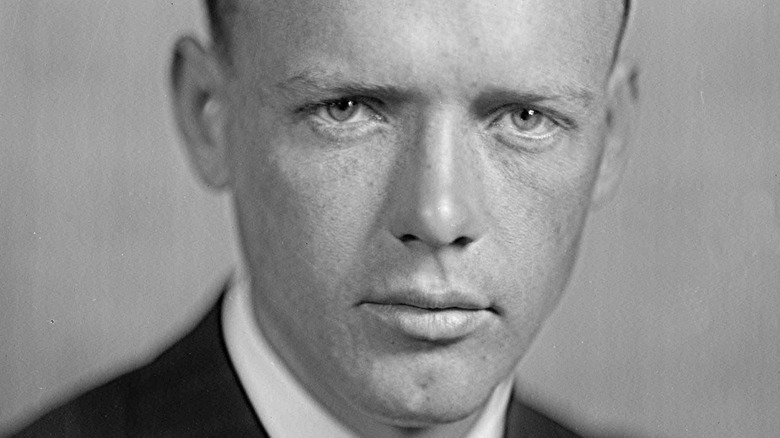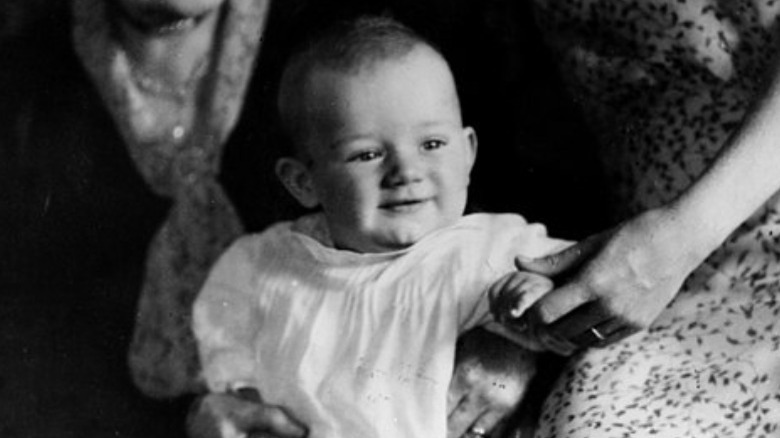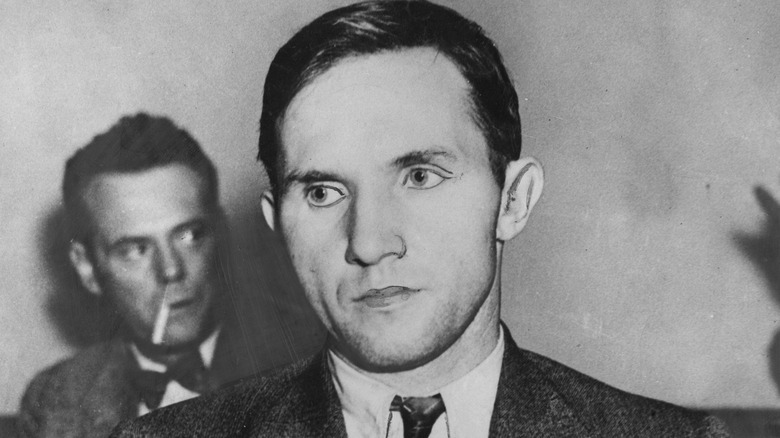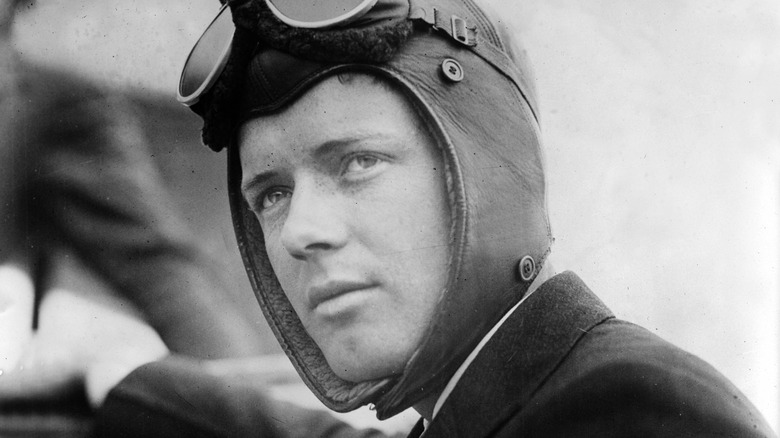The Charles Lindbergh Baby Theory That Would Change Everything
It was the crime of the century when Charles and Anne Lindbergh's 20-month-old son, Charles Lindbergh Jr., was abducted in 1932. Charles Sr. was famous for completing the first solo non-stop flight across the Atlantic Ocean in 1927. Lindbergh's celebrity status only grew from that point (via Britannica). After a headline-grabbing investigation, young Lindbergh Jr. was found dead just a few months after he disappeared. Through an equally high–profile trial, Bruno Hauptmann was convicted of kidnapping and killing Lindbergh's son. Hauptmann was later executed. He maintained his innocence until the very end, as Britannica goes on to explain.
Could Hauptmann have been telling the truth, and could the wrong man have been convicted and put to death for the infamous Lindbergh baby kidnapping all those years ago? According to "The Lindbergh Kidnapping Suspect Number 1: The Man Who Got Away," released in 2020 (via The Topeka Capital-Journal) that's exactly what happened. As the book's author, Lise Pearlman, asserts, the notorious crime's perpetrator could be the last person anyone would expect: Charles Lindbergh Jr.'s own father, the famous aviator, Charles Lindbergh himself.
The night Lindbergh Jr. disappeared
It was 10 p.m. on the evening on March 1, 1932 when Charles Lindbergh and his wife were alerted that their toddler had gone missing. After searching their expansive New Jersey estate, a ransom note for $50,000 was found — the first of 12 ransom notes that would turn up throughout the investigation, each one demanding more money with new terms and conditions for the boy's return, according to the FBI. Mud was found on the floor of the nursery on the night that Lindbergh's son disappeared, but no blood stains or fingerprints were reported. There were also segments of broken ladder discovered. The investigation concluded that ladder was split as the kidnapper either made his way to or from the child's upper-story bedroom.
Several items belonging to the child were also uncovered around Lindbergh's estate during the investigation into the kidnapping. Try as authorities might, though, the whereabouts of Lindbergh's son remained a mystery. In May, 1932, a young boy's dead body was found some four miles from Lindbergh's home, as if by chance. The child's skull was crushed and coroners estimated the child had been dead roughly two months, fitting the Lindbergh case timeline. The body was identified as Lindbergh Jr., as the FBI website also notes.
Clues point to Hauptmann
Prior to the discovery of young Lindbergh's body, Charles Lindbergh Sr. did pay some ransom to the purported kidnapper, per their demands. That ransom was paid by Lindbergh in the form of so-called gold certificates, just as those became scarce. It was the midst of the Great Depression, and President Roosevelt had recently suspended the gold standard as a means to stimulate the economy, as Federal Reserve History explains. Those gold certificates, as well as the wood from the broken ladder discovered at the scene, both played a part in the conviction of Hauptmann, a German immigrant who emerged as a leading suspect two years later.
Implicating Hauptmann were Lindbergh's gold certificates, which Hauptmann used to make a purchase. Once he became a suspect, more of Lindbergh's ransom was found in Hauptmann's home. So, too, were wood samples matching the ladder found at the scene of the crime. (Still other certificates showed up, turned into the Federal Reserve and signed by someone who was never identified, per the FBI.) Hauptmann denied his involvement from the start. He claimed the certificates were given to him. Nonetheless, Hauptmann was convicted of capital murder and executed in 1936. He refused an 11th-hour offer to save his life — life in prison, instead of execution — in exchange for a confession, as The Topeka Capital-Journal goes on to report.
What was allegedly missed about Lindbergh
Decades later, there's little to be done if Bruno Hauptmann was, in fact, wrongly convicted and executed for the crime of kidnapping and murdering Charles Lindbergh's son, and not much chance to definitively prove who the real culprit was. Based on author Pearlman's book "Lindbergh Kidnapping Suspect Number 1," though, there's a case to be made that Lindbergh himself could have been guilty, and the reason that investigators failed to consider that possibility was Lindbergh's fame. It was also inconceivable at the time for a father to commit such an act.
Pearlman is not the first scholar to speculate that Lindbergh played a part in his son's death. In "CRIME OF THE CENTURY: The Lindbergh Kidnapping Hoax," published in 1993, authors Gregory Ahlgren and Stephen Monier posit that Lindbergh's son died in an accident for which Lindbergh was responsible, based on reporting from the South Florida Sun-Sentinel. In her book, Pearlman takes it one step further. Could Lindbergh — a Nazi-sympathizer known to believe in eugenics, a controversial and discredited theory that inherited genetic traits could be bred out of the human race, creating some kind of master race (per PBS) — offered up his son to a scientist with similar views for an experimental medical procedure, during which Lindbergh knew his son would die? It's impossible to say for sure. Based on the case that Pearlman lays out, it's a chilling, if fascinating thought to consider, based on reporting from The Topeka Capital-Journal.



